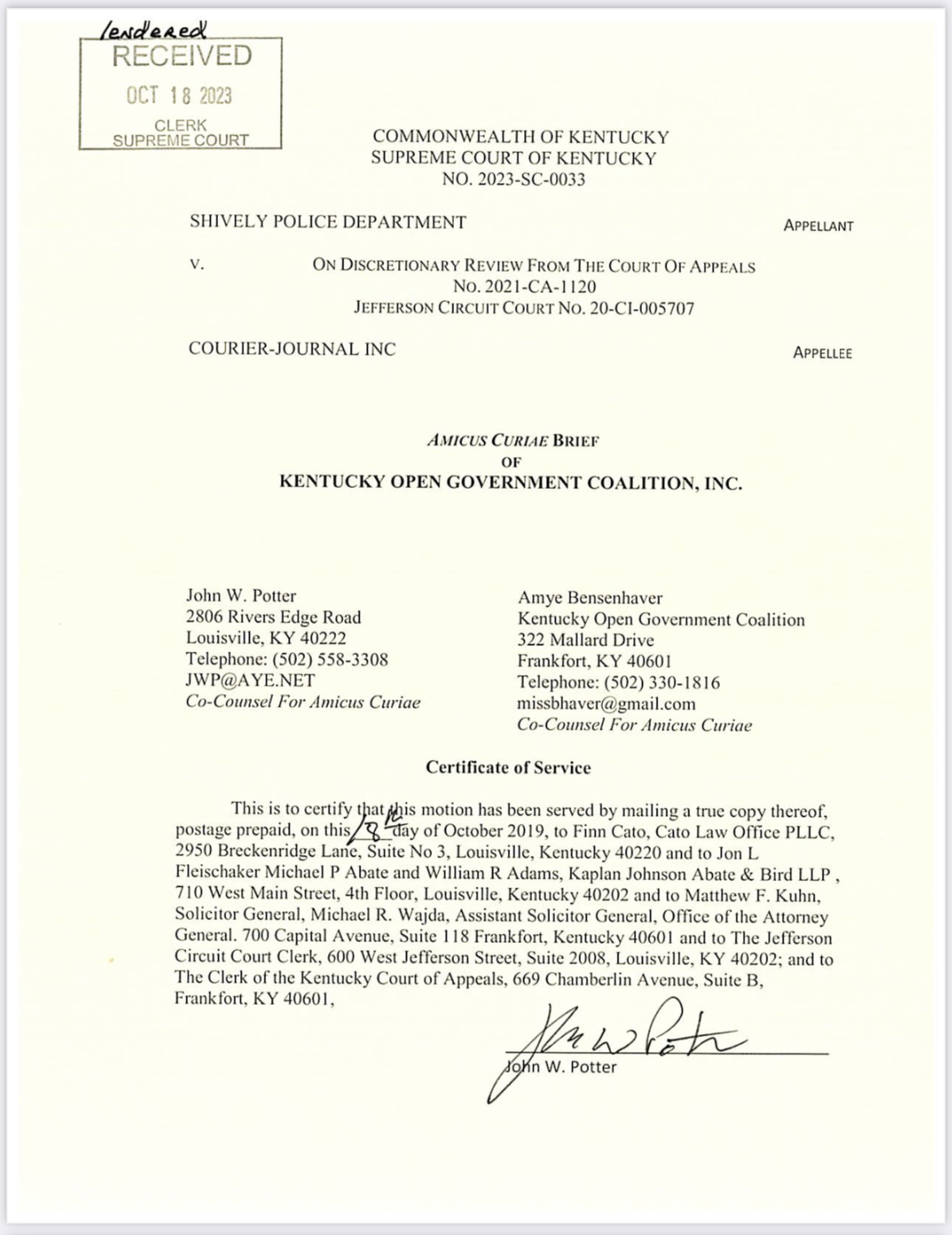
On October 18, the Kentucky Open Government Coalition and co-counsel, retired Jefferson Circuit Court Judge John Potter, tendered to the Kentucky Supreme Court an amicus brief in Shively Police Department v Courier Journal, Inc.
In it, Potter and the Coalition examine the previously unexamined legislative history of the Open Records Act and the Criminal Records and Statistics Act, both enacted in 1976, to confirm beyond any doubt that KRS 17.150(2) "is an affirmative expression of when records are public, not an implied
expression of when they can be kept secret."
"The legislative history," Potter and the Coalition conclude, "supports the Courier's position."
KRS 17.150(2) is the statute on which law enforcement agencies regularly rely to sidestep KRS 61.878(1)(h), the open records "law enforcement" exception, and its required showing of "actual, concrete harm" to the agencies in their prospective law enforcement actions.
https://apps.legislature.ky.gov/law/Statutes/statute.aspx?id=54126
https://apps.legislature.ky.gov/law/statutes/statute.aspx?id=46877
KRS 17.150(2) is also the statute which the Kentucky Attorney General has routinely misapplied since the Kentucky Supreme Court overruled 1992's Skaggs v Redford in 2013's City of Fort Thomas v Cincinnati Enquirer. The Supreme Court expressly rejected any implication in Skaggs that "the mere fact that an enforcement action remains prospective is enough to establish that disclosure of anything from a law enforcement file constitutes 'harm' under" KRS 61.878(1)(h).
https://caselaw.findlaw.com/court/ky-supreme-court/1643297.html
https://casetext.com/case/skaggs-v-redford
•Shively Police Department v The Courier Journal Inc.•
The case began in 2020 when The Courier Journal sued the Shively Police Department for failing to provide records relating to a high speed police chase that ended in the deaths of a woman, her son, and a baby, and whether officers complied with department pursuit policies.
https://www.courier-journal.com/story/news/crime/2020/10/07/shively-pol…
In November, 2022, a unanimous panel of the Court of Appeals ruled:
“'[G]eneral allegations of potential harm which would seem to apply in any criminal investigation' are not sufficient to justify wholesale denial of an open records request for records relating to an open investigation.”
http://opinions.kycourts.net/COA/2021-CA-001120.PDF
At the time, the Kentucky Open Government Coalition observed that the Shively Police Department case:
"forcefully repudiates law enforcement efforts to indefinitely postpone public access to records in open investigations where disclosure of those records would not 'harm the agency in the prospective action.'
"Courier Journal v Shively Police Department reaffirms the Supreme Court’s holding in City of Fort Thomas v Cincinnati Enquirer but takes an additional — and critical — step beyond by rejecting KRS 17.150(2) as a default position for law enforcement agencies determined, for whatever reason, to withhold all records in an open investigation regardless of the existence of any harm.
"The court expressly rejects past and present attorneys general's broad application of the statute 'to restrict all access to information which law enforcement has which may pertain to a prospective law enforcement action,' observing that 'such opinions are not controlling, and we disagree with such an interpretation based on the statutory language. Instead, given the paucity of relevant and applicable controlling authority interpreting KRS 17.150(2), we decide this issue in accordance with our own interpretation of its relevant statutory language.'
"The Court of Appeals repudiates Shively’s reliance on KRS 17.150(2) to 'essentially swallow[ ] up the limitations contained in the KRS 61.878(1)(h) exemption.'
“'KRS 17.150(2) provides for the complete disclosure of intelligence and investigative reports maintained by criminal justice agencies after prosecution is complete, subject to four specific exemptions. Therefore, KRS 17.150(2) should only apply if the conditions set out in its prefatory language are met. There is no reaching the exceptions where a determination to prosecute has been made and the prosecution is not yet completed.'
"Simply put, KRS 17.150(2) is a disclosure statute, with exceptions, that applies after prosecution is complete. It is not a nondisclosure statute and does not apply while the investigation/enforcement action is ongoing.
https://kyopengov.org/blog/kentucky-court-appeals-opinion-rejects-law-e…
•Kentucky Open Government Coalition's amicus brief•
As Coalition co-counsel, Potter frames the issue before the Supreme Court as one of first impression -- never before addressed by the appellate courts. Based on his exhaustive research into the legislative history of KRS 17.150, he concludes that the intended purpose of this "uncontroversial, niche, backwater
statute" was "collecting crime statistics" to satisfy federal crime reporting requirements and "provid[ing] the governor with an annual report on crime in Kentucky." KRS 17.150(2) "is a statement of when documents must be produced. It is not also an implied statement that the documents must otherwise remain secret."
In other words, the statute on which Shively relies, past and present attorneys general have misapplied, and the Kentucky Court of Appeals correctly rejected the application of, "is a declaration that documents are public after a specitied event; not a statement that they are protected from public disclosure before that event."
•Judge John Potter•
Described as "exacting and intellectual, with an unquestioned integrity," Potter served on the Jefferson Circuit Court for 20 years, and later as a senior judge, earning the respect of his peers and of the bar. The Kentucky Open Government Coalition is honored to partner with him in offering the Kentucky Supreme Court a critical perspective about the open records case now before it.
https://www.bishop-accountability.org/news2005_01_06/2005_06_13_Long_Po…
https://www.courier-journal.com/story/news/investigations/2019/09/11/st…



